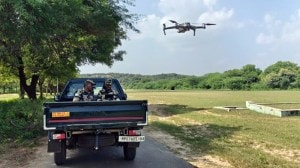Private airlines get first window in foreign skies
It was the seventh paragraph in the India-Sri Lanka joint statement issued today, buried amid nine issues—from fisheries to defence. Bu...

It was the seventh paragraph in the India-Sri Lanka joint statement issued today, buried amid nine issues—from fisheries to defence. But allowing private Indian airlines to operate to Colombo is arguably the most significant—a landmark in Indian civil aviation history.
Just one foreign destination is a tiny window—private airlines have been asking for access to the lucrative Gulf and South East Asia routes—but it’s an ‘‘important step,’’ said Minister of State for Civil Aviation Rajiv Pratap Rudy.
|
|
|
|
|
Vajpayee
|
Wickremasinghe | |
More so given that it took 45 years for the Government to let private players enter this sector and that, too, as ‘‘taxi operators’’ in early 1992.
In fact, according to the joint statement, the two countries have decided to do away with the need for even commercial agreements between two airline operators.
Prime Minister Atal Behari Vajpayee was the prime mover behind this proposal accepted without much hesitation by visiting Sri Lankan Prime Minister Ranil Wickremasinghe.
Under the aegis of the Comprehensive Economic Partnership Agreement signed with Sri Lanka, the joint statement read: ‘‘With a view to increasing tourist flow and connectivity, it was also decided to encourage private scheduled airlines of India, who operate only in the domestic sector at present, to extend their operations to airports in Sri Lanka.’’
|
Just one destination
but landmark in aviation |
|
A telling coincidence on Tuesday Story continues below this ad |
In other words, any scheduled Indian operator can fly into Colombo by just obtaining ATC clearance. ‘‘This is an important step, which will bring in more competition and improve business,’’ Rudy told The Indian Express‘‘And let me tell you, this does not mean the Government will not back Indian Airlines or Air India. We, in fact, want them to benefit from the competition.’’
Just last Saturday, Rudy had indicated as much. When asked by The Indian Express Editor-in-Chief Shekhar Gupta on NDTV 24X7 Walk the Talk about the growth of Indian private airlines in the international sector, he said: ‘‘It’s a very valid demand…we must take this proposal for the consideration of the Government…And I think there is a wide degree of consensus also. The only threat that emerges there is the airlines—Indian Airlines and Air India. But I also have a responsibility towards them… I am also trying to tell them to gear up to beat competition.’’
As of now, Sri Lanka is taken care of by Indian Airlines which flies a daily flight from Chennai to Colombo ferrying 1,286 passengers a week.
But there are exceptional days like today when IA had to replace its Airbus 320 with a Airbus 300 because of passenger rush from Colombo. While 145 passengers flew out from Chennai, 241 passengers flew in from Colombo.
For the Colombo-Mumbai and Colombo-Delhi sectors, Indian Airlines has a seat-sharing arrangement with Air Lanka.
With a policy decision now taken, this could all change if private operators were to take the opportunity and start services to Colombo.
But private airlines were guarded in their reaction saying they would wait for a detailed note from the Ministry of Civil Aviation on the matter.
It’s learnt that Jet Airways and Air Sahara had been lobbying hard for opening up the Gulf and South East Asia sectors. The same has also been conveyed to the Naresh Chandra Committee set up for civil aviation reforms.
Though it was expected that a decision on this would be taken up only after the committee made its recommendations, Vajpayee seemingly had other plans.
Photos





- 01
- 02
- 03
- 04
- 05

























